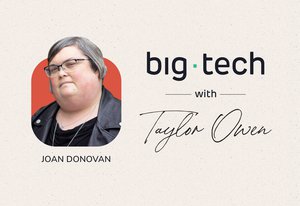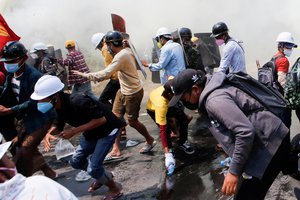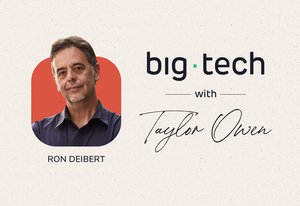This transcript was completed with the aid of computer voice recognition software. If you notice an error in this transcript, please let us know by contacting us here.
Pranav Dixit: In India, they are in a place where they have to decide how much these liberal Western values apply in a country that is this huge, attractive market with a billion users, but is also sliding into authoritarianism. How do you balance both those things?
Taylor Owen: Hi, I'm Taylor Owen and this is Big Tech.
My last international trip before the pandemic was to a conference on platform governance in Singapore. Speakers at the event outlined a range of tech policies being debated and implemented in the EU, the US, and in Canada. Things like imposing liability on platforms for the content on their sites, extending criminal law to certain online behaviour, and creating government oversight for content moderation. There were also members of the Singapore government in the audience who were in the process of developing their own set of laws. Laws that sounded a lot like the ones being developed in more liberal countries, but that have ended up being used to crack down on speech and to quell dissent. This is happening in a range of other illiberal leaning countries too. Turkey, the Philippines, Hungary, Poland, Brazil, and India.
The Indian government has recently imposed a new set of sweeping regulations, what they call, "IT rules," in an attempt to seize greater control over the platforms and the content on their sites. These rules are widely seen as a means of cracking down on the speech and political activities of Indian civil society.
This is just the latest chapter in a tense, complicated relationship between the Indian government and the tech companies. Pranav Dixit has been covering it from nearly the beginning. He's a technology reporter with Buzzfeed News, and has seen many of these issues emerge firsthand. He's also just received a Nieman Journalism Fellowship, and will be spending the next year studying at Harvard.
I want to do an episode a little bit later, where I really dive into the weeds on the challenges of governing technology and online speech in different geopolitical contexts. But I think to do that, we need to understand what's actually happening on the ground in countries like India, where the platform governance conversation looks much different than it does here. To help me do that, here is Pranav.
I want to start with an article you wrote recently that really caught my attention, and many others obviously, that you called, I Thought My Job Was to Report On Technology in India, Instead I Got a Front Row Seat to the Decline of My Democracy. I'm curious what your beat was like when you first started covering this topic?
Pranav Dixit: I think like a lot of tech journalists, I got into this because I was interested in, "What's the shiny new phone around the corner?" That was ... I used to be on all the gadget blogs, figuring out what are the new features in iOS. I think, for a long time, that was sort of my world. And I think what happened over time is that, as tech became more and more mainstream, as tech exploded around the world, as Silicon Valley sort of exported its sensibilities to the rest of the planet and started trying to get all these hundreds of millions of users outside the US to use its products .... I think tech sort of seeped into everything. It seeped into culture, it seeped into politics. It really became this inseparable part of society in general.
Taylor Owen: That interplay seems critical here. You write that "for years, you tried to live in the comforting fiction that what was happening in India and what was happening in the world of tech were separate things. But that's not true anymore." How did you come to that realization?
Pranav Dixit: I think that realization emerged from a very specific place, to be honest. Back when I started writing about tech for BuzzFeed News ... Also, maybe a couple of years before that. 2015-ish. I think it was a time of great hope and optimism when it came to tech in India. I think it was about 2015 when Google had this big splashy event in the country and Sundar Pichai had just become the CEO of that company. He came to India. It was his first trip to India, his home country, as CEO.
[CLIP]
Harsha Bhogle: Since the verdict has come out loud and clear, let's call Sundar Pichai.
SOURCE: Google India YouTube Channel
“#Ask Sundar: Google CEO Sundar Pichai, live in conversation at Delhi University”
December 17, 2015
Pranav Dixit: He made pretty big announcements, and he met the prime minister. It was a big deal. He was on all the front pages. And it was a time when a big Silicon Valley tech company like Google was saying, "Hey, look, this is where our next billion users," as they like to call them, "are going to come from."
Taylor Owen: It's always the next billion.
Pranav Dixit: It's always the next billion. Yeah, exactly. India is a country that has 1.4 billion people. It was a time that was full of like hope and optimism, and Google was sort of throwing free wifi at railway stations in the country. There was venture capital that was flowing in. There were lots of startups that were mushrooming in Bangalore. Amazon was looking to come to the country, and Netflix was looking to come to the country, and we had just gotten Uber. It was a really exciting time. Suddenly, we were at the same table as the rest of the world was. So I started writing about tech during that time of hope and optimism. It was very exciting to write about it. Over time, especially in the last year or so, more and more I started realizing that, "Oh my god, my stories are all about how the government is censoring content published to social media." How the government is cutting off people's internet. More and more, I realized almost every story that I wrote involved the government somehow. And that made me really depressed, because I was like, "Did I actually sign up for this?" I don't think so.
Taylor Owen: Where's my iPod launch event?
Pranav Dixit: Exactly. And it's funny because I still remain a gadget enthusiastic to some extent. I still ... WWDC, which is Apple's flagship developer conference is coming up next week. And I'm really excited to just sit through that extended commercial.
Taylor Owen: A moment of Zen.
Pranav Dixit: Exactly. I still care about that stuff, but that's sort of become secondary for me in terms of what I write about now.
Taylor Owen: Watching this from a distance and from the outside, I've been struck in the past year how the description of the state of Indian democracy has taken a quite radical turn.
Pranav Dixit: We went from calling us as the world's largest democracy to now every story everybody writes, it's like, "India's increasingly authoritarian government." Right? That's become the label.
Taylor Owen: Absolutely. And it's not just the broad media, but even all the big projects globally that track the state of democracy in different countries are raising alarm bells. I saw just yesterday the V-Dem Institute, which is this project that ranks democracies around the world, now labels India an electoral autocracy, which is a pretty slippery slope to a full autocracy.
Pranav Dixit: Look, to some extent, I don't think even the United States was immune to this during the Trump era.
Taylor Owen: Of course.
Pranav Dixit: Right after Trump became president, tech journalism in the US also became about misinformation and how the platforms were treating what Trump posted, and their policies around the president, to the rise of Q'Anon, to the insurrection at the Capitol. I think, to a large extent, some of this happened in the US as well. But I think in India particularly ... Unlike Trump, Modi is not being voted out. He won by a landslide. We've got elections coming up in about three years in 2024. There's worries that maybe he's going to come back. And then, what's going to happen? I think the worrying thing about India is just how fast we seem to have slid down this slope. We weren't talking about all this so much, even five or six years ago. It was not like this.
Taylor Owen: And so, what you've spent your time writing on and working on has been this interplay between that slide and the emergence of certain technologies and platforms into Indian society. I'd like to spend a little time talking through how that happened. I feel like, at least from an outside perspective, one of the places, one of the debates that seem to catalyze both Indian society and reaction to some of these technologies and the adoption of them was the introduction of Free Basics by Facebook in 2014.
[CLIP]
Mark Zuckerberg: We believe that connectivity is a human right, and that connectivity can't just be a privilege for some of the rich and powerful. It needs to be something that everyone shares.
SOURCE: Internet.org YouTube Channel https://youtu.be/LIvYUft2wJM
“Free Basics”
June 22, 2015
Taylor Owen: I wonder if you could talk a little bit about what that was? What they were trying to do and why? And how Indian society reacted?
Pranav Dixit: Sure. Free Basics, which used to be known as internet.org ... It still is. It's not dead yet. It's a Facebook initiative where Facebook presents it as a philanthropy effort. In a nutshell, how it works is Facebook says, "Here's a list of 20, 40, 50 websites that we've approved. And we will strike deals with carriers in certain countries." And if you access these websites that Facebook's approved, and of course Facebook is one of those websites, you will not be charged. It won't count against your data. They'll be free. Critics of this say that this violates net neutrality, because according to net neutrality principles, everybody should be able to access all websites equally and not have a certain section of the web walled off or treated differently. That was what Free Basics was. And Facebook was trying really, really, really hard to push it into India. And then, there was a huge human and cry about what was happening, which was very surprising. Because net neutrality is not something that the average person on the street knows about or cares about really. But there was a big campaign and influencers on the internet and comedians on the internet got involved. That's how it sort of snowballed into this big campaign against Facebook. Facebook tried to do many things to push it. Obviously, they were lobbying the government at the highest levels, but they also went on massive advertising and publicity campaigns. There were Free Basics billboards all across the country. They even tried to get millions of Indians to send a petition to the internet regulator, asking them to save Free Basics. The end game and the fallout of all this was Facebook lost. Eventually, I think this was in early 2016, the Indian telecom regulator decided that differential pricing was not something that would be allowed in India. Differential pricing just means that if you are an internet service provider, you cannot charge people differently to access different websites. It's all or nothing. Since differential pricing was banned, Free Basics defacto became illegal. What's interesting about this whole episode is that, I think that was the first time that we saw any sort of sustained activism against a big internet, Silicon Valley tech giant in the country. Before that, it was kind of a free run for them.
Taylor Owen: It seems like it didn't curtail adoption really in any significant way. Maybe there'd be even more users using Facebook-operated operating systems on phones or whatever it might be. But the adoption rate has been significant since. And the relationship between the government and these platforms has not exactly continued to be hostile. In fact, quite the opposite in many ways. It seems like Modi used these platforms to really entrench his power after 2014.
Pranav Dixit: Absolutely. In fact, I would say even before 2015. Modi is often known as the first social media prime minister. They were very, very savvy in figuring out how to use social media to really get their message across. Modi is somebody who has never had a press conference. He doesn't talk to journalists except the ones that he sort of likes.
Taylor Owen: So it's all direct via social?
Pranav Dixit: It's all direct via social. It's absolutely a one-way messaging street. You will never take ... You will never see Modi take an unscripted question anywhere. He really figured out how to get his message across. And the BJP, which is the party that he belongs to, it's India's ruling party ... They were very, very savvy and very, very organized in figuring out how to use the internet to spread propaganda across the country. And it really worked for them. It worked for them quite well. We didn't really have this sort of established, powerful right-wing ecosystem online before the last six or seven years, I would say. It didn't exist. And now it's a very powerful ecosystem.
Taylor Owen: And so, how did that interplay between him and the platforms play out? What are some examples of how he would either use or abuse it and they would push back? Were they fully acquiescing to the more radical use cases emerging from him and his supporters?
Pranav Dixit: Yeah. I think Modi is smarter in many ways than Trump.
Taylor Owen: It's a low bar there.
Pranav Dixit: It's a low bar, but Trump would just wake up and tweet whatever the hell he wanted. That made it almost easier for the platforms, I would say, to take action against him. There was something you could point to as a violation of policies, even though they were very inconsistent in how they applied those policies to him. But there was something you could point to, because he was shooting his mouth off. You will never see Modi tweeting like Trump does. He will not shoot his mouth off. I mean, somebody is writing these tweets for him. They go through a system, you can tell. But the one thing that he does do is follow all these abusive trolls. If you go to Modi's Twitter account and see the people he follows, a majority of them are just vial, abusive, misogynistic trolls, who will go after anybody who criticizes the BJP or the prime minister on Twitter. They will come after you. Your mentions will get flooded. I think what's happened is even though Modi doesn't say anything himself, him and his party have really enabled this entire ecosystem of supporters to say what they want. Unfortunately, for whatever reasons, the platforms have not been able to ... I don't want to say not been able to, but have been unwilling to take any kind of drastic action against these people.
Taylor Owen: And why do you think that is?
Pranav Dixit: I think, honestly, it's a business decision. They have to stay in the country. This is the biggest market. They have their eye on the billion users. The next billion, as we said. And it's the cost of doing business. It's a delicate dance that they have to do, where they have to strike a balance between standing up for their users on one hand, but also standing up for themselves in their business in the country. Because you still have to deal with the same government when it comes to policies, and when it comes to just making money in the country,
[CLIP]
Raghvendra Rao: The government of India in February this year, they came out with the new social media guidelines, which stipulate that messaging platforms would need to make revisions for the identification of the first originator of information. In this case, chat messages.
BBC News YouTube Channel https://youtu.be/zyKu7DxzcR4
“Whatsapp sues Indian government over privacy rules - BBC News”
May 26, 2021
Taylor Owen: What have been these new IT rules that the government's put in place?
Pranav Dixit: Oh, man. These very controversial ... You will see the word, "draconian," written in many places. That is used to describe these IT rules. It was an executive order that pushed these rules. These new IT rules are not laws, in the sense they did not go through any parliamentary lawmaking process. They were just laid down one day by a ministry. Everybody was told, "You have three months to comply with these." And it's a hefty set of rules. But long story short, some of the highlights are things like they have to appoint something called, "grievance officers," which is really just somebody at the company that the government can go after if the government doesn't like something that the companies did. They have to appoint these people, for instance. They have to take down content that essentially the government doesn't like. The government says that it has its own reasons for asking social media platforms to take down certain content. They cite vague, broad things, like things that are a threat to India's national security. But that can mean anything and that can include dissent. They must take down these things. When it comes to encrypted platforms like WhatsApp, for instance, the government wants them to build in something called traceability, which means that the government wants WhatsApp to be able to tell them who sent a message. Who was the originator of a message? Let's say you get a forward on WhatsApp that's come to you after being forwarded by 10 people, but the government wants to find out who sent it first. WhatsApp says that's not possible, because our platform is encrypted. Even we don't know what's flowing through the platform. That's a legal tussle that's happening right now between the government and WhatsApp. So there's many, many things like that in these IT rules that have suddenly been thrust upon everybody that just give the government a very, very powerful legal stick to beat the social media platforms into doing what they want.
Taylor Owen: Have the farmers protests and COVID given more pretext to these regulations from the government side?
Pranav Dixit: Yeah. Look, the farmer's protests have been happening in the country for many, many months, and reached a fever pitch in February when thousands and thousands of farmers set camp outside New Delhi, which is India's capital. What you saw was, as criticism of the government became more and more pronounced and more and more intense, the more desperate the government seemed to become in terms of cracking down on the platforms. There have been multiple instances of the government asking Twitter, for instance, to take down tweets that have been critical. First, because of the farmers protests. And then, because of how the government handled the COVID-19 pandemic.
Taylor Owen: This seems almost happening in both directions there, where Twitter has been willing to both block tweets in response to government requests, but then label government tweets as being manipulated media on the other hand.
Pranav Dixit: Twitter is stuck in a really, really hard place. In February, the government asked Twitter ... This is how it sort of all began. The government asked Twitter to take down 250 tweets that were mostly critical of the government, because there were farmers protests happening at that time. And Twitter did take down most of those tweets. They were forced to comply with the government's demands. And then, they restored some tweets. And then, they came out with a statement that said, "Because of free speech reasons, we are not going to take down tweets and Twitter accounts belonging to journalists, activists, media houses, and politicians." That was how it all started. I think that was the first time Twitter actually took such a public stand in the country, and it sort of snowballed from there. They were asked to take down tweets by the government repeatedly over the next few months, and they took down some and they left some up. I think things came to a head in May, when a bunch of BJP ministers tweeted a document that they said came from the Indian National Congress, which is the primary opposition party. They said the document included things that were essentially strategies cooked up by the Congress to defame the government and its handling of the pandemic. And Twitter put a manipulated media label on ... First, it put the label on a single BJP spokesperson's tweet. And then, it put this label on a dozen other Twitter accounts. They were all members of the BJP. This really made the BJP mad. There was one night at the end of May when Delhi Police lined up at Twitter's Indian headquarters. Nobody was there, because everybody was working from home and it was a lockdown. But I think it sent a signal to Twitter saying, "Hey, look, if you mess around, if you put your labels on tweets belonging to members of the ruling party, we are going to come after you."
Taylor Owen: How would you characterize the place the platforms are in right now, here? Do you think they're stuck in this need to be in the Indian market, but also figuring out how to have some pretence of their core values remain? How do you see that playing out with the platforms?
Pranav Dixit: No, absolutely. I think that platforms are really, really stuck between a rock and a hard place right now. I think they are stuck between making a choice, and really deciding whether to stand up for the principles that they claim that they stand for, which is essentially Western liberal values of free speech and democracy. In India, they are in a place where they have to decide how much these liberal Western values apply in a country that A, on one hand is this huge, attractive market with a billion users, but is also like sliding into authoritarianism. How do you balance both those things is something that I think they're going to have to increasingly figure out over the next few months and years.
Taylor Owen: Yeah. I couldn't agree more. Part of the real bind, I think, therein is that it's not just a country that they have to deal with here. It's the governance in 150 plus countries, all with varying degrees of democratic legitimacy. One of the ironies of the discourse in democratic countries is the language being used here to regulate the internet or regulate platforms is being used or copied identically in countries where they're doing it for liberal ends. I was recently at an event, right before the pandemic event, in Singapore. And it was remarkable. The government was using basically identical language as European governments in the EU to talk about and even write, draft legislation that was clearly being used for liberal purposes. I wonder how you look at that tension, right? In some ways, the IT rules in India look a lot like Canadian-proposed harmful speech regulations.
Pranav Dixit: Yeah. I mean, there's some wild things in there. Like asking WhatsApp to build in traceability.
Taylor Owen: That gets discussed in democracies too. There's a lot of police forces in Canada that would like to have a backdoor to encryption. Right?
Pranav Dixit: Yeah, absolutely. Also, the UK, I believe, and Australia also. This is not just happening in India. But it's interesting, because I think the platforms fumble, particularly, especially in countries like India. Look, on one hand when they operate in countries like the US with an established first amendment and liberal values and a proper functioning democracy for the most part ... You have the platforms operating in countries like that, where they more or less have an easier job when it comes to framing policies and rules. Then, they kind of know what to do. And then, you have them in countries ... Just completely totalitarian authoritarian countries like China, for instance, where it's easier for them to decide, "Look, we just cannot operate at this market. We have to pull out. We cannot be there."
Taylor Owen: Although they're searching. They're searching for that wiggle room to get in. Right?
Pranav Dixit: Sure, sure. Of course, because it's always about the next billion. But what do you do in a country like India, which is sort of in between? It's not quite completely liberal, but it's also not quite completely authoritarian. How do you navigate that space? Which I think is something that they're struggling with.
Taylor Owen: Another tension there is that, if one is living at one of those established democracies you mentioned, or largely functioning democracies ... As a citizen, you might want your government being the one to make rules about speech. To regulating speech. But in other contexts, you might prefer the platform's definition of free speech than your government's. I'm wondering how you feel about that? Would you essentially rather Facebook be determining the speech of Indian citizens? Or the Indian government?
Pranav Dixit: No, I definitely don't want Facebook deciding the speech of Indian citizens, but we're in a time when you also don't want the government to be in charge of all that. I think this is the government that has a trust deficit with people. You don't know if they're doing something with the right intention. In most cases, it's to amass more and more power and crack down on anybody that they don't like. And that's purely going by the track record so far. The one thing that the platforms haven't done right, is they have not been transparent at all. They have been completely opaque in how they come up with their policies and how they implement these policies. I think that hurts them, especially when it comes to countries like India. I'll give you the example that we talked about, which is the manipulated media label. They put this label on this raging political controversy in the country, and didn't bother to explain to anybody why they put that label on those tweets. You can't do that. You can't just slap a label that says that something that is at the heart of the biggest political controversy in the country that involves the ruling party and the opposition party is manipulated media. If you put that label, you've got to explain why you put that label. I think not being transparent really hurts them.
Taylor Owen: We started a conversation talking about this illiberal slide and how you've watched that play out over the past half-decade. You're about to leave India for a year in the US. I'm wondering if you're optimistic about what you'll come back to and about the near future of India?
Pranav Dixit: If I had to answer that question honestly, it's really hard to be optimistic right now. It's ... Personally, I'm dreading the future. We don't know where we are headed. The sense of optimism, the sense of hope, the sense of, "You can do anything," the sense of aspiration ... I think, sadly, that has been greatly, greatly diminished over the last few years. so, no. To answer your question, no. I'm not optimistic about what's going to happen at the end of the year. Wow. That sounds like a really sad answer, but it's true.
Taylor Owen: That was Pranav Dixit. Big Tech is presented by the Centre for International Governance Innovation, and produced by Antica productions.
Please consider subscribing on Apple podcasts, Spotify, or wherever you get your podcasts. We release new episodes on Thursdays every other week.




